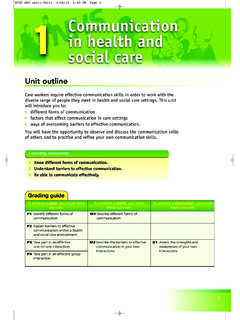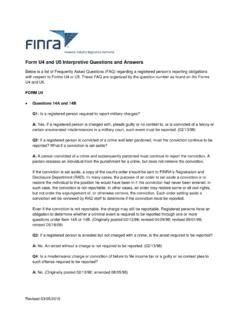Transcription of UNIT 4 4 Social influences on health and wellbeing
1 88 Learning aim A: Explore the effects of socialisation on the health and wellbeing of individuals Topic Primary and secondary socialisation Topic Effects of socialisationLearning aim B: Understand the influences that relationships have on the health and wellbeing of individuals Topic influences of relationships on individualsLearning aim C: Investigate the effects of Social factors on the health and wellbeing of individuals Topic How Social factors influence health and wellbeingSocial influences on health and wellbeing4 UNIT 489175966 BTEC 88-8915/01/13 12:28 PM91 Social influences on health and wellbeingUNIT 490 Primary and secondary socialisationKey termsAgent (of socialisation): an individual who is involved in socialising others as a result of their work role or personal relationship Norms: the rules of socially appropriate behaviour in a societyPrimary socialisation: the process through which infants and children begin learning the norms or expectations of society; this usually happens within their familySecondary socialisation: the process of learning attitudes, values and Social norms outside of the family, usually through education, work and friendship relationshipsSocial skills: the talking, listening and relationship skills a person needs to communicate and interact with processesSocialisation is the process of learning values, ideas, practices and roles; it is about becoming a socially aware and socially skilled member of a society.
2 As a newborn baby, you came into the world with no sense of self and no knowledge of the rules of your society. You didn t know about acceptable behaviours, or how you should relate to others. You learnt this through primary and secondary socialisationYour primary socialisation as a member of society began within your family during infancy and early childhood. A child s family (parents, carers and siblings) are known as agents of primary socialisation. They usually teach an individual: the norms or expectations of society attitudes and values about what is right and wrong basic Social skills, like the importance of saying please and thank you ways of speaking and behaving towards children are taught how to behave normally so that they can fit in, becoming accepted members of Social groups and our broader society. Primary socialisation also has an important influence on a child s ways of thinking and their expectations of people outside of their to this chapterPeople are Social animals.
3 We need and develop relationships with those around us, forming important emotional bonds with members of our families and with friends. The people we are close to, especially those we spend time with during infancy and childhood, are very influential in shaping our attitudes, behaviour and beliefs. This chapter focuses on different types of Social relationship, as well as a range of broader Social factors that influence human development, health and socialisation involves teaching basic care skills as well as Social skillsSecondary socialisationSecondary socialisation occurs from later childhood onwards and continues to the end of an individual s life. It involves learning a range of new skills and attitudes, and also modifying our existing attitudes, values and behaviours. Agents of secondary socialisation include: friends peer groups the media teachers and youth workers faith leaders (such as priests, imams and rabbis, for example) Social workers employers and work develop and change as individuals as a result of going to school, getting a job and spending time with non- family members, for example.
4 Schools, the mass media, workplaces, friends and peer groups all play an important part in our secondary socialisation, shaping the person we become. This process continues throughout our studyJan is a nursery nurse. She works in an early years playgroup with children aged three to five years of age. Jan sets up a range of indoor and outdoor play activities and supports the children who take part in them. Jan also helps the children to manage their personal hygiene, to get their shoes and coats on and off and encourages them to talk and behave in socially acceptable ways. As part of this, she praises the children when they make a good choice but also points out when they have made a bad choice in the way they behave or relate to Identify two ways in which Jan is socialising the children at Describe how Jan teaches the children the difference between right and wrong .3. Explain why it is important that Jan demonstrates appropriate behaviour and tells the children about ways of speaking and relating to assessment Identify agents involved in the primary and secondary socialisation Explain the influence of agents of primary and secondary socialisationDiscussHow might the media (TV programmes and adverts, radio, magazines and books) and other young people (at school or college perhaps) also play a part in the socialisation of adolescents?
5 Give an example of how each of these factors might influence a young person s BTEC 90-9115/01/13 12:28 PM9392 Primary and secondary socialisationEffects of socialisationHow does socialisation happen?Socialisation processes are sometimes deliberate and easy to observe. For example, when a parent tells a child what to do or when a person is penalised or punished in some way for breaching Social norms, socialisation is happening. Parents and carers, as well as siblings and other people who have a close relationship with a young child, may: explain how or why a child should behave (say please or think you ) show the child what to do (holding cutlery or a cup properly, for example) model behaviour (greeting people, being friendly towards others).In all of these cases the agent of socialisation is trying to shape or develop the child s attitudes, values and behaviour to enable them to fit in with Social norms.
6 Socialisation can also occur in more subtle ways too; when a young person learns from the example being set by a parent or sibling or when they are given praise for behaving in a way that conforms to what is expected and acceptable in studyEmma is in her second year of nurse training. Her interest in nursing developed from watching hospital dramas on television when she was younger. Emma has since learnt that real- life nursing is much harder work and less glamorous than the programmes led her to believe. She is currently working in an assessment unit for older people with medical problems. Heidi, the ward sister, is Emma s workplace mentor and assessor. Emma has learnt a lot from watching and listening to Heidi. She says that she would like to be as confident and compassionate as Heidi is when faced by difficult care situations and when dealing with relatives and other senior staff in the How did the media influence Emma s socialisation as a nurse?
7 2. What role has Heidi played in Emma s professional socialisation?3. How has Emma s contact with Heidi helped her to develop as a nurse?Your assessment Identify agents involved in the primary and secondary socialisation Explain the influence of agents of primary and secondary socialisationDiscussReflect on your own experience as a child or your more recent experiences with young children (as a parent, carer or sibling, perhaps) and try to identify ways in which: you experienced some form of socialisation by other family members you acted as an agent of your examples and experiences with class colleagues. How do you think your own experiences of socialisation have shaped you as a person?Socialisation outcomesA wide range of socialising agents contribute to the socialisation processes that run through the whole of the human life course, having a major impact on an individual s personal identity, relationships and behaviour.
8 Socialisation influences who we become and how we learn to fit into society, as well as many of our lifestyle choices and rolesA person s sex refers to whether they are biologically male or female. Gender refers to the behaviour society expects from men and women. The gender expectations that are imposed on girls and boys during childhood and adolescence have a powerful impact on the kind of people men and women become. In Western societies girls are socialised to express so-called feminine qualities, such as being kind, caring and gentle. This leads to assumptions about gender roles, such that women should look after children, cook and do non- manual work. In contrast, boys are socialised to express accepted masculine characteristics such as being boisterous, aggressive and tough. This leads to assumptions that men should go out to work, do physical, manual jobs and be decision- makers. Parents, schools, friends and the media all play a part in gender gender expectations that an individual experiences influence the way their identity develops, how they relate to others and the opportunities that may be open to them.
9 The idea that boys and men should experience better opportunities than girls and women especially in education and employment because they are thought to be the superior sex is not as powerful as it once was. However, gender does still play an important part in an individual s intellectual, Social and emotional development because ideas about socially acceptable ways for men or women to behave remain very powerful in , values and Social normsParents are a key socialising influence on children during the early years of life. In particular, children learn basic attitudes, values and norms from parents throughout childhood and into adolescence. Children absorb and learn a set of attitudes and values from their parents or carers through: what they hear their parents say observing the way their parents react and behave listening to what their parents tell them about how they ought to behave and termsAttitude: a way of thinking and behaving that expresses beliefsGender: the Social and behavioural expectations that are associated with males (masculine) and females (feminine) in society Norms: expected patterns of behaviour and beliefRole: an expected pattern of behaviour Values: ideals that a person believes are importantReflectHow might a person s work role and experiences influence their Social development?
10 Give a couple of examples to show how work roles and experiences could affect an individual s Social skills and assessment Outline the main effects of socialisation on the health and wellbeing of Describe the effects of socialisation on the health and wellbeing of Explain the effects of primary and secondary socialisation on the health and wellbeing of individual, with reference to relevant examplesDiscussWhat does growing up as a girl involve in today s society? How are the expectations placed on girls different to those of boys? Has this changed much since the time when your mother and grandmother were your age? Share and discuss ideas about this with class BTEC 92-9315/01/13 12:28 PM9594 Social influences on health and wellbeingUNIT 4 Effects of socialisationFor example, if children see their parents expressing prejudiced attitudes about a minority group, they are likely to see this behaviour (and the attitudes being expressed) as acceptable.









